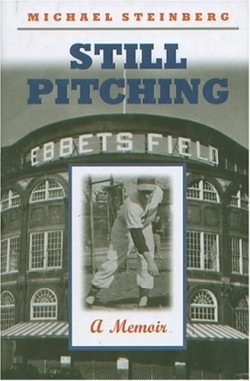Still Pitching
A Memoir
To pigeonhole this book as a “baseball memoir” is equivalent to calling Izaak Walton’s The Complete Angler a tract on fishing. Both books far exceed the subject matter indicated by their titles, though clearly the national obsession with-or national pastime of-both baseball and fly-fishing does indeed foster a similar fanaticism, one that borders more often than not on the spiritual. The author enters this territory early on:
I feel a catch-in-the-throat sensation-a sense of wonder and awe that still overwhelms me every time I visit a baseball stadium. It’s a signal that I’m about to cross a sanctified threshold and enter a world of gods and heroes, a universe where ordinary life falls away, where the stakes are high and the outcome is always in doubt.
The “gods and heroes” that Steinberg invokes include not only the greats who still loom larger than life in the culture’s collective imagination, but those who don’t-the other Babe, for example, George “Babe” Herman, “who had the ignominious distinction of winding up on third base with two other teammates.” And it’s with these outcasts, these “fellow pretenders” that Steinberg feels his greatest affinity, and discovers his most enduring metaphors for struggle and acceptance, for enacting that next “gritty (if improbable) comeback.”
It’s the ‘50s in New York, and this wonderfully moving memoir is as deeply committed to place and family and growing up as it is to baseball and its perennial contention club of that systolic decade, the old Brooklyn Dodgers. It’s a memoir about community and friendships both Jewish and non-Jewish, about loyalty, but mostly-and with a prose style as convincing as the pop of a Sandy Koufax fastball in the catcher’s mitt-it mines that interior territory where the heart confronts its deepest fears and desires, and puts them all at risk, thus creating honest and enduring human tensions.
The memoir answers not so much the Alice question of “Who am I?” but rather, “How do I shake this loser image?” The answer, of course, is by toughing it out, and by staying resilient even while being maligned and publicly embarrassed by verbally abusive egocentric coaches, and by being relegated yet again to water boy or stretcher bearer—“always the subordinate role.”
Still, even the worst of these coaches-in this case the unsavory, in-your-face Kerchman-finds redemption in this narrator’s field of dreams, his exacting and compassionate field of vision: “It was absolutely nuts, but my first impulse was to feel sorry for him.”
If it’s better to be loved than feared (that anti-Machiavellian edict to which the memoir’s young narrator subscribes wholeheartedly) it nonetheless leaves him vulnerable and continually suspicious about whether he has the grit to struggle on in the face of “last season’s failure,” whether it be at shortstop or on the pitching mound, or in the equally uncertain area of young love, or in that even shakier realm where the self’s worth and doubt collide unrelentingly. Right, the Dodgers all over again, those “sad-sack losers of the National League,” and it’s the narrator’s ability to measure his own private longings and disappointments against that larger construct that helps give the book such weight and dimension, such honestly earned depth and complexity.
If the narrator feels “chumped” more times than seems fair in his adolescent appraisal of the world, he’s equally capable of “unconsciously grieving the loss of [his] childhood,” and later acknowledging that loss in all its remembered glory. This smart book captures growing up in all its experiential immediacy, and then retells it with the perspective and wisdom of forty years, with that sharp-edged awareness of Marvell’s “time’s winged chariot hurrying near.”
This is a stunning debut memoir by a writer of the very first order, who is also the editor of the prestigious award-winning nonfiction journal Fourth Genre, and winner of The Missouri Review award for nonfiction. Still Pitching is a winner-it changes speeds, sinks and rises in ways that delight, nips the corners, keeps the reader just off-balance enough with its perfect blend of humor and seriousness, and its intimate knowledge of this game called baseball that both kids and grown men play and love, and then replay forever in memory.
Disclosure: This article is not an endorsement, but a review. The publisher of this book provided free copies of the book to have their book reviewed by a professional reviewer. No fee was paid by the publisher for this review. Foreword Reviews only recommends books that we love. Foreword Magazine, Inc. is disclosing this in accordance with the Federal Trade Commission’s 16 CFR, Part 255.

